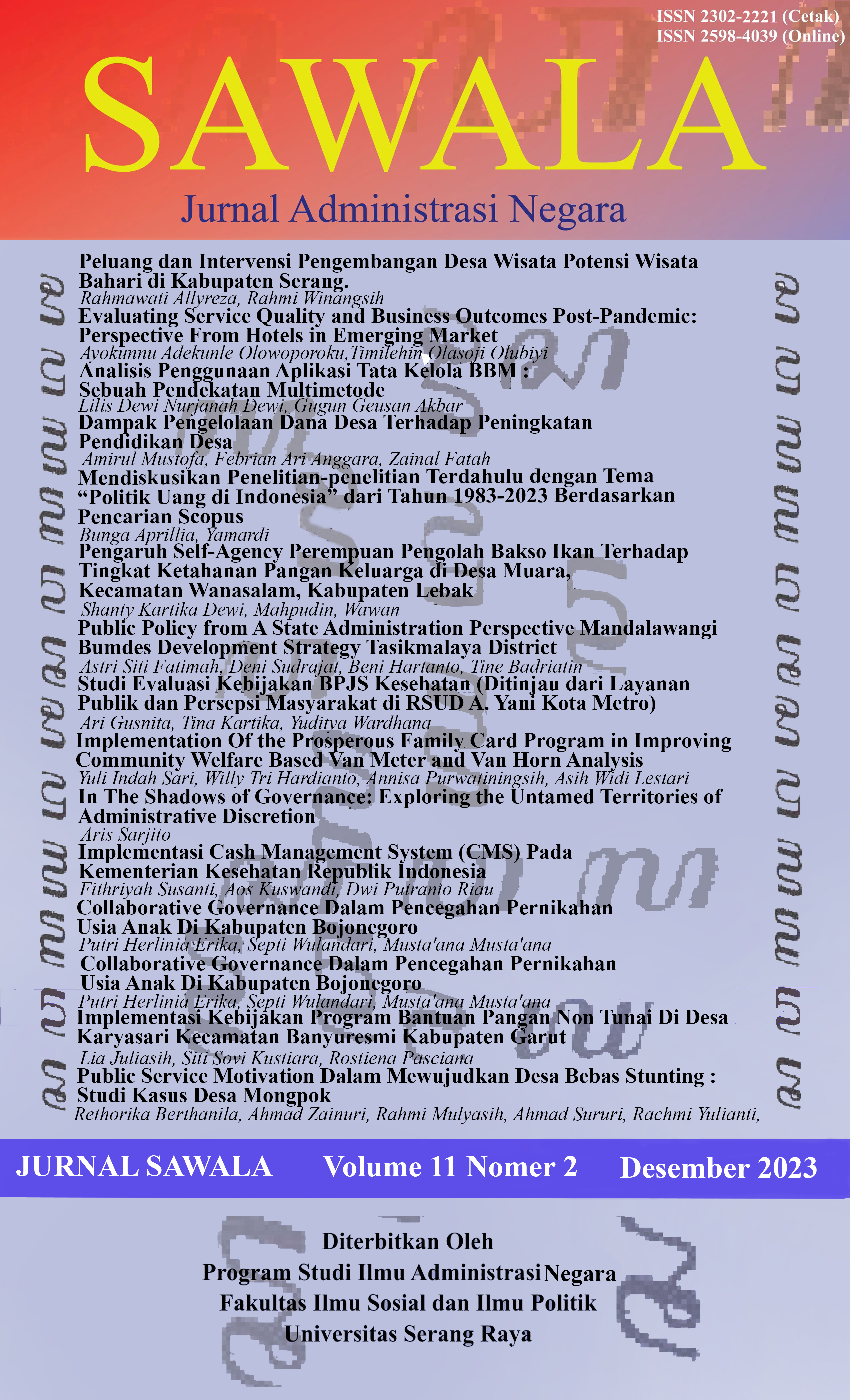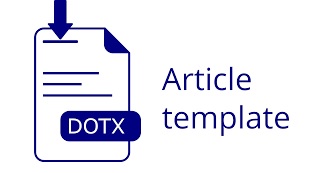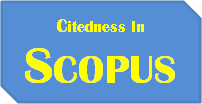Implementasi Cash Management System (CMS) Pada Kementerian Kesehatan Republik Indonesia
DOI:
https://doi.org/10.30656/sawala.v11i2.7559Keywords:
Cash Management System (CMS), McKinsey 7S Method, SWOT Analysis, QSPM AnalysisAbstract
Cash Management System (CMS) is a service provided by banks for institutions or companies to be able to manage finances non-cash. This non-cash policy is something that has just been implemented within the Directorate General of Pharmaceuticals and Medical Devices. This study aims to determine the implementation of CMS using the McKinsey 7S model, and analysis of strategies with SWOT and QSPM to obtain the best alternative strategies to improve CMS implementation. The method used is descriptive qualitative using primary and secondary data. The results of the study reveal that CMS implementation has been going well, although system errors, transaction failures and third parties still cannot make non-cash payments. The best alternative strategy that can be applied to institutions is to prepare SOPs, improve the quality of financial human resources, and carry out regular CMS evaluations. Thus, the implementation of CMS Banking within the Directorate General of Pharmaceuticals and Medical Devices still needs to be refined by considering the results of alternative strategies so that CMS implementation can be better in realizing clean, transparent and accountable financial management.
References
Abdul Wahab, S. (2012). Analisis Kebijakan: Dari Formulasi ke Penyusunan Model - Model Implementasi Kebijakan Publik. PT. Bumi Aksara.
Agustino, L. (2014). Dasar - Dasar Kebijakan Publik. CV. Alfabeta.
Cahya, W. C. (2020). Cash Management System, Inovasi yang Memudahkan Bendahara Satker oleh : Wisnhu Chrisnur Cahya.
Chrisnur Cahya, W. (2020). Cash Management System, Inovasi yang Memudahkan Bendahara Satker. https://djpb.kemenkeu.go.id/kppn/tanjungselor/id/data publikasi/artikel/2844-cash-management-system,-inovasi-yang-memudahkan bendahara-satker.html
Hendrawan, S., Anisah, N., & Nafidah, L. N. (2019). Implementasi Transaksi Non-Tunai Sebagai Dasar Tata Kelola Pemerintah Yang Baik: Studi Kasus pada Pemerintah Kabupaten Jombang. Akuntabilitas, 12(2), 227–236. https://doi.org/10.15408/akt. v12i2.12150
Islamy, Muh. I. (2014). Kebijakan Publik. In: Definisi dan Makna Kebijakan Publik. Universitas Terbuka.
Kasmad, R. (2013). Studi Implementasi Kebijakan Publik. Kedai Aksara. http://ucs.sulsellib.net//index.php?p=show_detail&id=42846
Lukmanulhakim, M., Djambak, S., & Yusuf, K. (2016). Lukmanulhakim, M., Djambak, S., & Yusuf, K. (2016). Pengaruh Transaksi Non Tunai Terhadap Velositas Uang di Indonesia. Jurnal Ekonomi Pembangunan, 14(1), 41-46. Jurnal Ekonomi Pembangunan, 14(1), 41–46. https://ejournal.unsri.ac.id/index.php/jep/article/ view/8774/4665
Marginingsih, R., & Sari, I. (2019). Nilai Transaksi Non Tunai Terhadap Pertumbuhan Ekonomi Di Indonesia Periode 2014-2018. Inovator, 8(2), 13. https://doi.org/10.32832/inovator.v8i1.2504
Monginsidi, E. C., Koleangan, R. A. M., & Rotinsulu, Debby. Ch. (2019). Analisis Implementasi Transaksi Non Tunai Dalam Pengelolaan Keuangan Daerah Kota Manado. Jurnal Pembanguan Ekonomidan Keuangan Daerah . https://doi.org/https://doi.org/ 10.35794/jpekd.32775.20.1.2019
Moshi, H. P. (2012). Implications of Cash-Dominated Transactions for Money Laundering. https://www.files.ethz.ch/isn/154325/Oct2012Moshi.pdf
Puji Utari, N., Salomo, R. V., Kurniawan, T., & Putra Zulkarnain, Z. (2017). Analisa pelaksanaan transaksi non tunai (non cash) berdasarkan prinsip good governance di pemerintah Provinsi DKI Jakarta = Analysis of implementation of non-cash transaction based on good governance principles in DKI Jakarta Provincial government [Universitas Indonesia]. https://lontar.ui.ac.id/detail?id=20459185&lokasi=lokal
Riau, D. P. (2022). Strategi Pengendalian Organisasi dalam Meningkatkan Kinerja Anggaran (Studi Evaluasi Pengisian Aplikasi Smart dan E-Monev dalam Kinerja Anggaran di Kpu Kab/Kota Jawa Timur). Syntax Literate ; Jurnal Ilmiah Indonesia, 7(5), 5265. https://doi.org/10.36418/syntax-literate.v7i5.6992
Sobko, V. (2014). Fraud in Non-Cash Transactions: Methods, Tendencies and Threats. World Applied Sciences Journal, 29(6), 774–778. https://doi.org/10.5829/idosi.wasj.2014.29.06.13930
Van Meter, D. S., & Van Horn, C. E. (1975). The Policy Implementation Process. Administration & Society, 6(4), 445–488. https://doi.org/10.1177/009539977500600404









